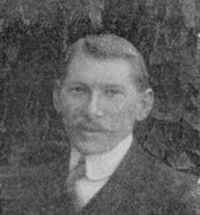Michael O'Dwyer
|
Sir Michael O'Dwyer GCIE KCSI |
|
|---|---|

Michael O'Dwyer ca. 1912
|
|
| Born |
8 April 1864 Barronstown, Ireland |
| Died | 13 March 1940 (aged 75) Caxton Hall, London |
| Cause of death | Assassination |
| Nationality | British |
| Alma mater | Balliol College Oxford |
| Occupation | Colonial Administrator |
| Spouse(s) | Dame Una O'Dwyer |
| Parent(s) |
|
| Lieutenant Governor of the Punjab | |
|
In office 1912–1919 |
|
Sir Michael Francis O'Dwyer GCIE KCSI (28 April 1864 – 13 March 1940) was Lieutenant Governor of the Punjab in India from 1912 until 1919. O'Dwyer endorsed General Reginald Dyer's action regarding the Amritsar massacre and termed it a "correct action". In 1940, aged 75, he was assassinated by Udham Singh.
Michael Francis O'Dwyer was the sixth son in a family of fourteen children born in Barronstown, County Tipperary to John, of Barronstown, Solohead, and Margaret (née Quirke) O'Dwyer, of Toem; both County Tipperary, Ireland. He was educated at St Stanislaus College in Tullamore and passed the entrance competition for the Indian Civil Service in 1882 and the final examination in 1884. He completed two years of probation at Balliol College, Oxford, where in his third year he obtained a first class in jurisprudence. Philip Woodruff has written of O'Dwyer's upbringing:
Michael O'Dwyer was one of the fourteen children of an unknown Irish land-owner of no great wealth, as much farmer as landlord. He was brought up in a world of hunting and snipe-shooting, of threatening letters and houghed cattle, where you were for the Government or against it, where you passed every day the results of lawlessness in the blackened walls of empty houses. It was a world very different from the mild and ordered life of southern England...One gets the impression [of O'Dwyer when at Balliol] of a man who seldom opened a book without a purpose, whose keen hard brain acquired quickly and did not forget but had little time for subtleties.
Joining the service in India in 1885, He was posted first to Shahpur in Punjab. He distinguished himself in land revenue settlement work, and was made director of land records and agriculture in Punjab (1896); next year he was placed in charge of settlements of Alwar and Bharatpur states.
...
Wikipedia
